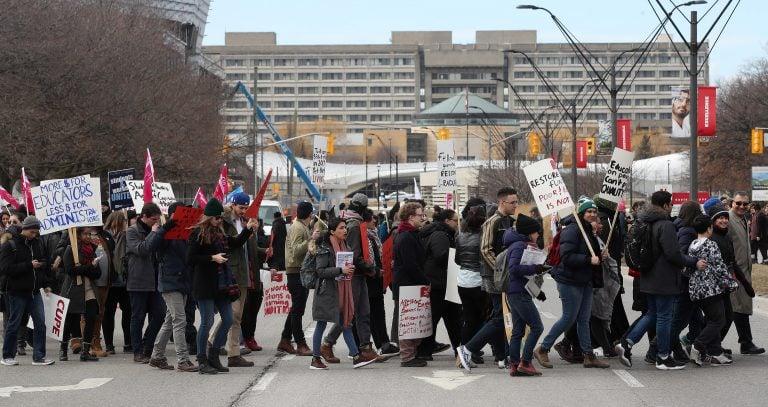York University Strike: Was the school right to continue classes?
A dispute continues over whether the school had the authority to keep its doors open

TORONTO- MARCH 5 – York University contract faculty go on strike as negotiations break down. The teaching assistants, part-time faculty and graduate assistants start the strike with a rally on Monday morning at Main Gate at York University inToronto. March 5, 2018. (Steve Russell/Toronto Star via Getty Images)
Share
As York University in Toronto approaches week three of a strike by contract faculty and other teaching staff, there is significant confusion among students regarding which classes are running and which are cancelled. But there is also a disagreement between student leaders and the administration over who had the authority to even make the decision about whether courses continue at all.
On March 14, York held a special senate meeting to determine whether that body—which is responsible for the school’s academic policy and comprised of faculty, administrators and student representatives—had the authority to decide whether classes would continue.
Due to a technicality, the chair—Lesley Beagrie of the faculty of health—elected to defer the vote to a later date. This ruling was challenged but upheld after a vote of 54 to 53 in favour of deferring.
MORE: York university strike: Why it keeps happening again and again
“We challenged the ruling that the Senate executive made to defer because we felt they were essentially ruling it out of order and undermining the authority of the Senate”, says Richard Wellen, president of York University’s Faculty Association (YUFA) and a senate member. “There was no reason to defer it other than to take the decision out of the hands of the Senate.”
YUFA has claimed that York’s decision to continue classes is a violation of senate policy. “Basically, the Board of Governors has been trying to convince the senate executives that they have really sweeping powers that essentially cancel out the powers of the senate,” says Wellen. But in the past,the decision to suspend classes has historically been the senate’s, Wellen says. “It’s always been a vote of senate or senate executives.” While the senate is responsible for academic matters, the board of governors “oversees the government, conduct, management and control of the University and its property, revenues, expenditures, and business and affairs,” according to the university secretariat, which administers governance at the school.
The school’s administration disagrees with the student leaders. According to Lisa Philipps, the vice president academic and provost: “We understand that some YUFA members have expressed that opinion. However, it is not the case. The responsibility to cancel classes is—and should be—determined by each faculty member who understands the subject matter best and based on preserving the academic integrity of the course. This is consistent with university policy and practice and we have heard from many community members that it serves them well.”
Philipps says approximately 55 per cent of classes—2,482 out of 4,525—are still running.
Last Thursday, another senate meeting was held. This time a vote took place solely to determine whether the senate had the authority to suspend classes. It passed 82 to 45 in favour. “When people realized the vote was not specifically about whether to suspend classes, but whether senate had the authority to suspend classes, more people were willing to vote for it,” says Wellen.
But there is no indication classes will be suspended any time soon. “There’s no motion to have a vote on whether classes will be cancelled,” Wellen says. “There are a lot of people recommending it, but the senate did not pass a motion directing senate executives to vote on that, and I think that motion might have failed if it was presented. The problem is a lot of people are saying the moment to suspend classes has passed; it should have been done initially.”
MORE: York University Strike: Confusion on Campus
Many members of the Canadian Union of Public Employees (CUPE) local 3903 feel York’s administration are using stalling rather than bargaining, in the hope that the provincial government will eventually step in and mandate the union back to work.
“They feel this way because York’s tactics mirror those used by the College Employer Council in their dispute with OPSEU last year,” says CUPE 3903 spokesperson Julien Arend. Teachers at Ontario’s colleges engaged in a five-week strike last fall before the Ontario government past back-to-work legislation.
However, in a recent email to union members, the Minister of Advanced Education and Skills Development, Mitzie Hunter, said the government wouldn’t be getting involved.
“It was indicated to the union that legislation was not in the works and that the government’s policy was that this should be resolved between the parties involved,” says Arend. “The prorogation of the house last week further indicates the government is unlikely to intervene in the short term.”
Philipps believes arbitration is the best option at this point. “We believe it is York and CUPE’s responsibility to do everything possible to reach an agreement without the government’s intervention. Third party binding arbitration is a widely accepted approach to reach agreement when both parties remain far apart on key issues. We urge CUPE to agree to go to arbitration,” she says.